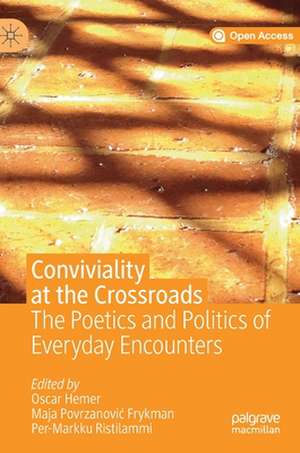Conviviality at the Crossroads: The Poetics and Politics of Everyday Encounters
Editat de Oscar Hemer, Maja Povrzanović Frykman, Per-Markku Ristilammien Limba Engleză Hardback – 6 dec 2019
| Toate formatele și edițiile | Preț | Express |
|---|---|---|
| Paperback (1) | 214.57 lei 6-8 săpt. | |
| Springer International Publishing – 11 sep 2020 | 214.57 lei 6-8 săpt. | |
| Hardback (1) | 233.03 lei 6-8 săpt. | |
| Springer International Publishing – 6 dec 2019 | 233.03 lei 6-8 săpt. |
Preț: 233.03 lei
Nou
Puncte Express: 350
Preț estimativ în valută:
44.60€ • 46.39$ • 36.82£
44.60€ • 46.39$ • 36.82£
Carte tipărită la comandă
Livrare economică 14-28 aprilie
Preluare comenzi: 021 569.72.76
Specificații
ISBN-13: 9783030289782
ISBN-10: 3030289788
Pagini: 270
Ilustrații: XI, 290 p. 3 illus., 1 illus. in color.
Dimensiuni: 148 x 210 x 18 mm
Greutate: 0.64 kg
Ediția:1st ed. 2020
Editura: Springer International Publishing
Colecția Palgrave Macmillan
Locul publicării:Cham, Switzerland
ISBN-10: 3030289788
Pagini: 270
Ilustrații: XI, 290 p. 3 illus., 1 illus. in color.
Dimensiuni: 148 x 210 x 18 mm
Greutate: 0.64 kg
Ediția:1st ed. 2020
Editura: Springer International Publishing
Colecția Palgrave Macmillan
Locul publicării:Cham, Switzerland
Cuprins
Chapter 1: Conviviality vis-à-vis Cosmopolitanism and Creolisation: Probing the concepts.- Chapter 2: Fantasy of conviviality: banalities of multicultural settings and what we do (not) notice when we look at them.- Chapter 3: Creolisation as a Recipe for Conviviality.- Chapter 4: Schleiermacher’s Geselligkeit, Henriette Herz, and the ‘Convivial Turn’.- Chapter 5: Cosmopolitanism as Utopia.- Chapter 6: Creolizing Conviviality: Thinking Relational Ontology and Decolonial Ethics through Ivan Illich and Édouard Glissant.- Chapter 7: A Convivial Journey: From Diversity in Istanbul to Solidarity with Refugees in Denmark.- Chapter 8: Bringing Conviviality into Methods in Media and Migration Studies:.- Chapter 9: Post-2015 Refugees Welcome Initiatives in Sweden: Cosmopolitan Underpinnings.- Chapter 10: The Bridge – Redux: The Breakdown of Normative Conviviality.- Chapter 11: Charting a Convivial Continuum in British Post-War Popular Music 1948-2018.- Chapter 12: Footballers and Conductors: Between Reclusiveness and Conviviality.- Chapter 13: Impurity and Danger. Excerpt from Cape Calypso.- Chapter 15: Seeing Johannesburg Anew: Conviviality and Opacity in Khalo Matabane's Conversations on a Sunday Afternoon.
Notă biografică
Oscar Hemer is Professor of Journalistic and Literary Creation at Malmö University, Sweden. His latest publications include the novel Misiones (2014), the co-edited collection In the Aftermath of Gezi: From Social Movement to Social Change? (2017) and the forthcoming book Contaminations and Ethnographic Fictions: Southern Crossings.
Maja Povrzanović Frykman is Professor of Ethnology at Malmö University, Sweden. Her recent publications include Sensitive Objects: Affect and Material Culture (2016), Migration, Transnationalism and Development in South-East Europe and the Black Sea Region (2017) and a Swedish-language monograph on on highly skilled migrants in Sweden (2018).
Per-Markku Ristilammi is Professor of Ethnology in the Department of Urban Studies at Malmö University, Sweden. His research focuses on the construction of alterity in urban environments, and he has also been engaged in several research projects concerning identity and integration in the transnational Öresund region.
Maja Povrzanović Frykman is Professor of Ethnology at Malmö University, Sweden. Her recent publications include Sensitive Objects: Affect and Material Culture (2016), Migration, Transnationalism and Development in South-East Europe and the Black Sea Region (2017) and a Swedish-language monograph on on highly skilled migrants in Sweden (2018).
Per-Markku Ristilammi is Professor of Ethnology in the Department of Urban Studies at Malmö University, Sweden. His research focuses on the construction of alterity in urban environments, and he has also been engaged in several research projects concerning identity and integration in the transnational Öresund region.
Textul de pe ultima copertă
Conviviality has lately become a catchword not only in academia but also among political activists. This open access book discusses conviviality in relation to the adjoining concepts cosmopolitanism and creolisation. The urgency of today’s global predicament is not only an argument for the revival of all three concepts, but also a reason to bring them into dialogue. Ivan Illich envisioned a post-industrial convivial society of ‘autonomous individuals and primary groups’ (Illich 1973), which resembles present-day manifestations of ‘convivialism’. Paul Gilroy refashioned conviviality as a substitute for cosmopolitanism, denoting an ability to be ‘at ease’ in contexts of diversity (Gilroy 2004). Rather than replacing one concept with the other, the fourteen contributors to this book seek to explore the interconnections – commonalities and differences – between them, suggesting that creolisation is a necessary complement to the already-intertwined concepts of conviviality and cosmopolitanism. Although this volume takes northern Europe as its focus, the contributors take care to put each situation in historical and global contexts in the interests of moving beyond the binary thinking that prevails in terms of methodologies, analytical concepts, and political implementations.
Caracteristici
Revives Ivan Illich’s 1973 lens of conviviality, placing it in concert with Paul Gilroy’s 2004 definition of cosmopolitanism and Cohen and Toninato’s 2010 concept of creolization Provides a useful alternative to binary theoretical and practical thinking both within and beyond academia, with relevance for policy implementations
